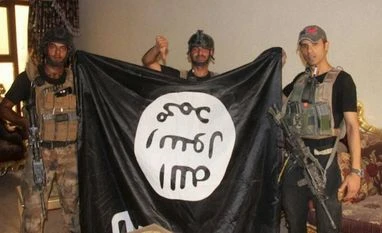The dreaded Islamic State terror group is luring foreign women recruits with a false sense of "empowerment", according to a new report by a UK think tank.
The report compiled by the Royal United Services Institute for Defence and Security Studies (RUSI) said the reasons that drove hundreds of women to journey from Europe to ISIS territories were "complex".
"We talked to women who hadn't been radicalised but could understand why some of these girls might have gone to Syria and Iraq so they could live as 'good Muslims'," said Emily Winterbotham, the report's co-author.
She said the use of the term "jihadi bride" to describe all female ISIS members was not truly representative.
"ISIS has been successful at selling that image to women. It's not just about the naive vulnerable jihadi bride, it's women saying: 'This is in line with my religion, my political beliefs, the fact I want to live how I want'," Winterbotham told 'The Independent'.
Possible draws were found to include "a rejection of Western feminism, online contact with recruiters who offer marriage and adventure, peer or family influence, adherence to ISIS ideology, naivety and romantic optimism, and the chance to be part of something new, exciting and illicit", she said.
The author said the concept of "empowerment" differed from what would be shared by most non-Muslim Western women, being seen through a dominantly religious lens.
"Women are saying 'this is empowering for me' but the irony is that's not going to happen once they get there," Winterbotham said.
"After speaking to men and women who knew female ISIS supporters or worked in de-radicalisation programmes, they found that some women saw the so-called Islamic State (ISIS) as a source of 'empowerment' despite its subjugation of women, violent enforcement of its interpretation of Sharia law," she said.
Winterbotham, a senior research fellow at RUSI, and co- author Elizabeth Pearson, a RUSI associate fellow and a PhD candidate in war studies at King's College London, conducted their research in the UK, Canada, France, Germany and the Netherlands.
The number of foreign women living in the so-called Islamic State is uncertain. A 2014 report estimated that 18 per cent all European ISIS members were female and the total number is now believed to be more than 550.
The report compiled by the Royal United Services Institute for Defence and Security Studies (RUSI) said the reasons that drove hundreds of women to journey from Europe to ISIS territories were "complex".
"We talked to women who hadn't been radicalised but could understand why some of these girls might have gone to Syria and Iraq so they could live as 'good Muslims'," said Emily Winterbotham, the report's co-author.
Also Read
"ISIS has been successful at selling that image to women. It's not just about the naive vulnerable jihadi bride, it's women saying: 'This is in line with my religion, my political beliefs, the fact I want to live how I want'," Winterbotham told 'The Independent'.
Possible draws were found to include "a rejection of Western feminism, online contact with recruiters who offer marriage and adventure, peer or family influence, adherence to ISIS ideology, naivety and romantic optimism, and the chance to be part of something new, exciting and illicit", she said.
The author said the concept of "empowerment" differed from what would be shared by most non-Muslim Western women, being seen through a dominantly religious lens.
"Women are saying 'this is empowering for me' but the irony is that's not going to happen once they get there," Winterbotham said.
"After speaking to men and women who knew female ISIS supporters or worked in de-radicalisation programmes, they found that some women saw the so-called Islamic State (ISIS) as a source of 'empowerment' despite its subjugation of women, violent enforcement of its interpretation of Sharia law," she said.
Winterbotham, a senior research fellow at RUSI, and co- author Elizabeth Pearson, a RUSI associate fellow and a PhD candidate in war studies at King's College London, conducted their research in the UK, Canada, France, Germany and the Netherlands.
The number of foreign women living in the so-called Islamic State is uncertain. A 2014 report estimated that 18 per cent all European ISIS members were female and the total number is now believed to be more than 550.
)